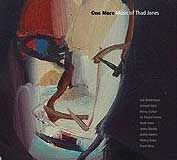Perhaps the word "perfection" is seen too often in music reviews. Nevertheless, One More - Music Of Thad Jones deserves that honor. There isn't a mediocre track anywhere. Seasoned fans know and love these compositions and novices won't find a better introduction to an unforgettable jazz composer. One More - Music Of Thad Jones just never stops swinging.
-- JazzReview.com
Aa session that can be an introduction for someone who wants to get into the essence of jazz - and will delight those who already know and can't get enough of it.
-- JazzTimes (Nat Hentoff's "Final Chorus")
The music on this CD has no cacophony, no torrent of notes going nowhere.. Everything meshes like the innards of a fine Rolex chronograph. I am satisfied that jazz as we know it and love it is alive and not only well, but strutting along main street in its Sunday best. It can get no better, unless we have a second coming of our mates in Bop heaven. There are not enough stars in the heavens to rate this album.
-- California Coast Jazz
This is as true and honest a tribute as you'll find, partly because of the presence of ex-Jones-Lewis Orchestra members and others of their generation and partly because of the Jones-like essence of the arrangements. There's transcendent soul here -- may as well call it love -- as if Jones has returned for a visit.
-- The News & Observer
"One More - Music of Thad Jones" showcases the timeless compositions of Thad Jones, one of the most influential jazz composers of the second half of the 20th Century, a composer who, in the words of Charles Mingus, wrote with "a pencil guided by God."
The recording features legendary musicians who were associated with Thad and performed his music throughout his career, including his brother, Hank; James Moody, Benny Golson and Frank Wess, three of the greatest masters of the tenor saxophone, who performed in Thad's assorted small groups as far back as the early 1950s; Bob Brookmeyer, Jimmy Owens and Richard Davis, who along with Hank were charter members of the Thad Jones - Mel Lewis Jazz Orchestra; and Roland Hanna, Hank's successor in "The Band" and one of its most featured performers.
Thad's compositions included in the CD range from his early, small group vehicles, like "Subtle Rebuttal," from a 1953 session featuring Hank and Frank Wess (who also provided the title for the tune); classics from The Band's repertoire, like "A Child Is Born" and "The Waltz You Swang For Me;" and a few rarely heard gems, like "Thad's Pad."
Among the many highlights of the recording are a classic "tenor battle" on the title tune between James Moody, Benny Golson and Frank Wess; a recreation of one of Roland Hanna's classic unaccompanied introductions to "A Child Is Born" (using material from Roland's previously-recorded performance on IPO 1004, "Tributaries - Reflections On Tommy Flanagan"); a beautiful extended solo by Jimmy Owens on "Consummation," written by Thad for a concert performance by Jimmy in 1969; and an unaccompanied solo performance by Hank of "Monk's Mood" (the only composition on the CD not by Thad), an arrangement that Hank learned, note-for-note, directly from Thelonious Monk in the mid-1940s and which was a favorite of Thad's.

